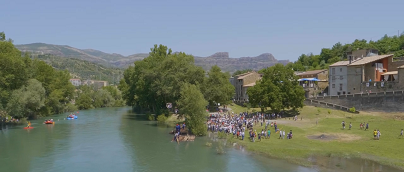
If you prefer to always view the website in English, please click here.
If you prefer to always view the website in English, please click here.
Action against climate change is one of our commitments towards achieving the United Nations sustainable development goals. This commitment is integrated into our business strategy, because we know that our future as a society depends directly on the sustainability of the planet.
The current rate of biodiversity loss and the rate at which our ecosystems are deteriorating shows the need for metrics to reveal the impacts and, above all, how dependent society is on nature and the services it provides. That is why it is essential to have assessment methods that allow us to take stock of how human activities change and take advantage of such services.
At Endesa, we have spent years studying the dependence and impact of our activity on the natural environment that surrounds our sites. For this reason, within our Biodiversity Conservation Plan, we promote projects that allow us to measure and assess this impact and draw conclusions to help us improve our relationship with nature.
This is the case with the project we have developed together with the environmental company GAENA in five reservoirs for hydroelectric generation that we manage in Galicia, Andalusia and Catalonia. Thanks to this project, called "Integrated evaluation of ecosystem services in the environment of several Endesa hydroelectric reservoirs", we have been able to assess the services that nature offers society (ecosystem services) in the catchment area of these reservoirs.
Antonio Casasola, an expert in climate change and biodiversity at Endesa, points out the keys to the project: "We have identified and analysed the impacts and dependencies generated by hydraulic activity on these ecosystem services: ecosystems in good condition usually have great biodiversity and offer more and better services than degraded ecosystems."
Thanks to this initiative, we have verified that reservoirs modify the ecosystem services on offer in their respective basins. "In general terms, we can say that they change very little of the spatial occupation, erosion control or the carrying capacity of livestock, and at the same time they provide access and enhance ecosystem services as necessary for society as the provision of water, food, energy, health and, ultimately, leisure,” Casasola said.
During the two years of the study, 2018 and 2019, we verified the positive effects of the reservoir on the environment:
This project is one of our initiatives to contribute towards biodiversity conservation, but it is not the only one. We have a working group on Energy and Natural Capital, a world pioneer in the assessment of ecosystem services in the sphere of activity of energy companies, to analyse in detail the impacts and dependencies of natural capital and ecosystem services in all our areas of activity, including water resources.
Protecting biodiversity and preserving natural wealth are two objectives that are fully integrated into our business strategy. Through projects like this we deepen the impact that our activity has on the ecosystem to contribute to the conservation and sustainable use of biodiversity.





